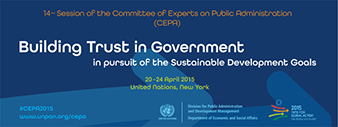The Committee of Experts on Public Administration held its fourteenth session in New York from 20 to 24 April 2015. Its theme was “Building trust in government in pursuit of the Sustainable Development Goals: what will it take?”.
Report
Arabic | Chinese | English | French | Russian | Spanish
The Committee addressed the issue of building trust in government in pursuit of the sustainable development goals, with an emphasis on the question “What will it take?” The outline of an answer was reflected in the sub-issues discussed, namely redefining relationships and responsibilities in support of participatory governance and responsive public service delivery, including through e-solutions; strengthening innovation, prioritization, informed decision-making and integration of policy development processes; and promoting accountable institutions, ethical leadership and integrity.
Public trust is rooted in citizens’ perceptions of the legitimacy of government action, for example, in the ability of officials to manage public resources effectively and, more generally, to consistently act in the public interest over an extended period. Building trust in government in pursuit of the sustainable development goals will depend primarily on the implementation of sound public policy that reflects people’s priorities and on institutional performance and the quality of public services. Bearing in mind national and local specificities, an ability to achieve political consensus and manage relationships with citizens will be an essential element without which technical and bureaucratic responses to the challenges of the sustainable development goals will be ineffective.
A critical element of participatory governance is citizen engagement, which is essential to identifying sustainable development priorities and expected outcomes at the national and local levels. In promoting citizen engagement in public policymaking, care should be taken to remove barriers to participation, in particular by marginalized groups, and to ensure both technical and substantive equality of opportunity in consultative processes. Open government, characterized by transparency, participation and collaboration, can assist in this regard. The Committee also noted that there is often a complex interaction between formal rules that define institutions, for instance constitutions and laws, and informal rules in the form of sanctions, taboos, customs, traditions and codes of conduct, which must be factored into institution building.
The Committee recalled that the drive for innovation in the public sector is due, in part, to the increasing complexity of the public agenda and recognition of the interdependence of development objectives at all levels. Flatter, more participatory structures are characteristic of collaborative approaches to governance, as are moves from authoritarian to more inclusive leadership styles, from centralized to decentralized arrangements, from an emphasis on process to an emphasis on outcomes and from organizational silos to collective action in pursuit of shared objectives. The Committee stressed that integration is not “business as usual” for most governments. Most policy development and funding will continue to flow through the sectors. Policy integration will rest on the ability to convince sectoral actors to explore the benefits of cross-sectoral cooperation, the critical foundation of which is the capacity for effective policy development within sectors.
The Committee stressed that the public sector has a critical role to play in pursuing all of the sustainable development goals and can have tremendous strategic value and influence, as evidenced by the fact that many important economic, social, scientific and technological innovations had their origins in government Political endorsement of the sustainable development goals at national and local levels will be essential and will provide a fundamental mandate to translate the goals and targets into action. Achievement of the sustainable development goals will also necessitate a steady and continued process of institutional and administrative reform, encompassing shifts in mindset and behaviour as well as transformation of processes and practice. National systems of accountability, as enablers of sustainable development, should be permeated with ethical values and standards, comprising a clear framework for monitoring, with priority given to public oversight of government. Corruption remains one of the most significant impediments to building effective and accountable institutions. Recalling the United Nations Convention against Corruption, the Committee stressed the need to accelerate the adoption of measures to prevent corruption in the public sector and end impunity for corrupt practices, recognizing that the prevention of corruption can be a complex and long - term challenge.
Lastly, the Committee reviewed the United Nations Programme in Public Administration and Development Management, taking into account the current and future role of the United Nations system in governance and public administration, reform of the Economic and Social Council and the promotion of normative - operational linkages within the Council system. The Committee noted that the governance aspects of proposed sustainable development goal 16 — to promote peaceful and inclusive societies for sustainable development, provide access to justice for all and build effective, accountable and inclusive societies at all levels — and aspects of goal 17, notably targets related to technology, policy and institutional coherence and multi-stakeholder partnerships, are areas where the programme can best support its work in the follow-up to the post-2015 development agenda.
 Bienvenue aux Nations Unies
Bienvenue aux Nations Unies
